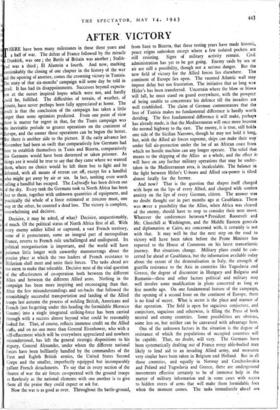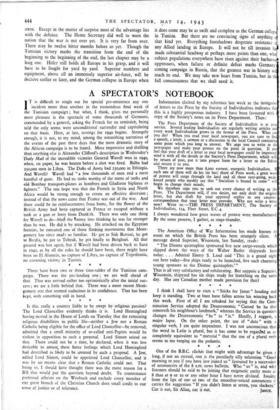AFTER. VICTORY
HERE have been many milestones in these three years and a half of war. The defeat of France followed by the miracle Dunkirk, was one ; the Battle of Britain was another ; ad was a third ; El Alamein a fourth. And now, marking mistakably the closing of one chapter in the history of the war d the opening of another, comes the crowning victory in Tunisia. he story of that six-months' campaign will some day be told in tail. It has had its disappointments. Successes beyond expecta- on at the outset inspired hopes which were not, and hardly 'mild be, fulfilled. The difficulties of terrain, of weather, of hmate, have never perhaps been fully appreciated.at home. The esult is that the conclusion of the campaign has taken a little anger than some optimists predicted. From one point of view here is matter for regret in that, for the Tunis campaign was he inevitable prelude to greater operations on the continent of urope, and the sooner those operations can be begun the better. ut there is another side to the picture. If the early advance last 'ovember had been so swift that comparatively few Germans had time to establish themselves in Tunis and Bizerta, comparatively few Germans would have been destroyed or taken prisoner. As things are it would be true to say that they came where we wanted them, where no choice would be left them but to fight and be defeated, with all means of retreat cut off, except for a handful who might get away by air or sea. In fact, nothing even worth calling a handful has escaped. The Luftwaffe has been driven out of the sky. Every tank the Germans took to North Africa has been lost to them, together with unknown quantities of equipment, and practically the whole of a force estimated at 2cro,000 must, one way dr the other, be counted a dead loss. The victory is complete, overwhelming and decisive.
Decisive, it may be asked, of what? Decisive, unquestionably, of much. Of the political status of North Africa first of all. With every enemy soldier killed or captured, a vast French territory, some of it protectorate, some an integral part of metropolitan France, reverts to French rule unchallenged and undisputed. Its political reorganisation is important, and the world will have ,f patience little longer with unworthy manoeuvrings about the precise place at which the two leaders of French resistance to a Hitlerism shall meet and unite their forces. The tasks ahead are too stern to make that tolerable. Decisive next of the vital question of the effectiveness of co-operation both between the different Allies and between the different Allied arms. Nothing in the campaign has been more inspiring and encouraging than that. After the few misunderstandings and set-backs that followed the astonishingly successful transportation and landing of the Allied troops last autumn the process of welding British, Americans and French (not fo:getting under this heading the formidable Morocco Goums) into a single integrated striking-force has been carried through with a success almost beyond what could be reasonably looked for. That, of course, reflects immense credit on the Allied staffs, and on no one more than General Eisenhower, who with a self-effacement which will be everywhere appreciated and nowhere misunderstood, has left the general strategic dispositions to his deputy, General Alexander, under whom the different national forces have been brilliantly handled by the commanders of the First and Eighth British armies, the United States Second Corps and the smaller, imperfectly equipped but incomparably gallant French detachments. To say that in every section of the theatre of war the air forces co-operated with the ground troops as flawlessly as the national elements with one another is to give 'hem all the praise they could expect or ask for.
Now the war is as good as over. Throughout the battle-ground, from Suez to Bizerta, that these testing years have made historic, peace reigns unbroken except where a few isolated pockets arc still resisting. Signs of military activity remain. Civil administration has yet to be got going. Enemy raids by sea or air are still a possibility, though not a serious danger. But the new field of victory for the Allied forces lies elsewhere. The continent of Europe lies open. The vaunted Atlantic wall may impose delay but not frustration. The initiative that so long was Hitler's has been transferred. Uncertain where the blow or blows will fall, he must stand on guard everywhere, with the prospect of being unable to concentrate his defence till the invaders arc well established. The claim of German commentators that the loss of Tunisia makes no fundamental difference is hardly worth deriding. The first fundamental difference it will make, perhaps has already made, is that the Mediterranean will once more become the normal highway to the east. The enemy, it is true, still holds one side of the Sicilian Narrows, though he may not hold it long, but, with the Allied air forces supreme, ships can make their way under full air-protection under the lee of an African coast from which no hostile machine can any longer operate. The relief that means to the shipping of the Allies as a whole, and the effect it• will have on any further military operations that may be under- taken in the Mediterranean area, is incalculable. The balance in the fight between Hitler's U-boats and Allied sea-power is tilted almost fatally for the former.
And now? That is the question that shapes itself charged with hope on the lips of every Allied, and charged with sombre anxiety on the lips of every German, citizen. The answer was no doubt thought out in part months ago at Casablanca. There was never a possibility that the Allies, when Africa was cleared of the enemy, should have to stop to consider their next move. Whatever the conferences between • President Roosevelt and Mr. Churchill at Washington, and the Middle Eastern generals and diplomatists at Cairo, are concerned with, it certainly is not with that. It may well be that the next step on the road to victory will have been taken before the Prime Minister has reported to the House of Commons on his latest transatlantic journey. But situations change. Military plans could be con- certed far ahead at Casablanca, but the information available today about the extent of the demoralisation in Italy, the strength of guerilla resistance to the Axis in countries like Yugoslavia and Greece, the degree of discontent in Hungary and Bulgaria and Rumania—these and other factors political and military may well involve some modification in plans concerted as long as five months ago. On one fundamental feature of the campaign, the opening of a second front on the continent of Europe, there is no kind of secret. What is secret is the place and manner of that operation. The field is open for sagacious conjecture, and conjecture, sagacious and otherwise, is filling the Press of both neutral and enemy countries. Some possibilities are obvious, some less so, but neither can be canvassed with advantage here.
One of the unknown factors in the situation is the degree of resistance of which the populations of occupied countries will be capable. That, no doubt, will vary. The Germans have been systematically drafting out of France every able-bodied man likely to lend aid to an invading Allied army, and measures very similar have been taken in Belgium and Holland. But in all those countries, and equally in Norway and Czechoslovakia and Poland and Yugoslavia and Greece, there are underground movements effective certainly to be of immense help in the matter of military information and in some cases with access to hidden stores of arms that will make them formidable foes when the moment comes. The tasks immediately ahead are stern. Except in the matter of surprise most of the advantage lies with the defence. The Home Secretary did well to warn the nation that the war is not over yet. It is very far from over. There may be twelve bitter months before us yet. Though the Tunisian victory marks the transition from the end of the beginning to the beginning of the end, the last chapter may be a long one. Hitler still holds all Europe in his grasp, and it will have to be fought for yard by yard. Superior numbers and equipment, above all an immensely superior air-force, will be decisive earlier or later, and the German collapse in Europe when it does come may be as swift and complete as the German collap in Tunisia. But there are no convincing signs of anything a that kind yet. Everything foreshadows desperate resistance any Allied landing in Europe. It will not be till invasion ha made substantial headway at perhaps more points than one, wh subject populations everywhere have risen against their barbaro oppressors, when failure or definite defeat marks Germany' coming campaign in Russia, that the greatest war in history w reach its end. We may take new heart from Tunisia, but in th full consciousness that we shall need it.



























 Previous page
Previous page